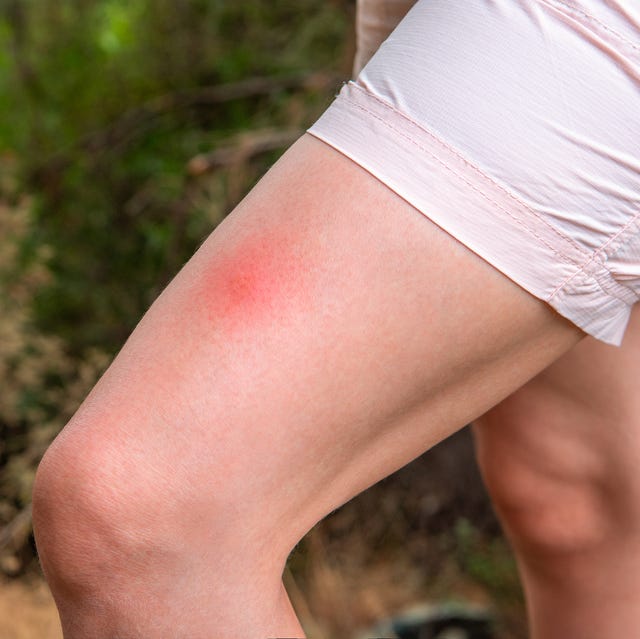Is My Bug Bite or Sting Infected? - Symptoms of Bug Bite Infection - Prevention Magazine

Pavel MuravevGetty Images
Dealing with an itchy bug bite or sting is distracting at best, but it usually gets better and easier to deal with over time. When your skin seems to be getting worse, however, it's only natural to wonder what's going on.
"At some point in time, you'll get a bite or two from an insect," says board-certified dermatologist Ife J. Rodney, M.D., founding director of Eternal Dermatology + Aesthetics in Maryland. "Most insect bites and stings go through a cycle where they are red, swollen, and itchy, slowly getting better as the days go on. This inflammatory response is good, as it is your body's way of dealing with the wound."
However, these bites and stings can get infected if you're not careful, she says. Here's everything you should know to keep your skin healthy this summer.
First, how should you care for a bug bite or sting?
If you're bitten by a mosquito or fly, for example, you really want to make sure that you wash the area every day with soap and water, says Cindy Wassef, M.D., assistant professor at the Rutgers Center for Dermatology in New Jersey. The same is true for a sting—you'll just want to make sure that the stinger is removed first.
"Minimizing itch as much as possible is important because scratching can break the skin barrier and make it prone to infection," Dr. Wassef says.
If you're struggling with itchiness, the American Academy of Dermatology (AAD) suggests applying an ice pack or OTC anti-itch cream (like Sarna) or an anti-inflammatory cream (like hydrocortisone) to the spot. If all else fails, cover the spot with a bandage to keep your fingers off of it.
You can take an oral antihistamine to tamp down the immune response, which drives that itchy feeling. If you've been stung and you're in pain, you can also take an OTC painkiller like acetaminophen or ibuprofen.
Why can bug bites or stings become infected?
"Regardless of the size of the insect, its bite or sting breaks your skin," Dr. Rodney says. "When that happens, bacteria living on the surface of your skin, or on the insect's mouthpiece, gets deeper into your skin. Scratching the bite opens up the skin even more, and you can transfer even more dirt and bacteria from your fingernails to the broken skin."
Bacteria like staphylococcus and streptococcus can get in that way, leading to an infection, says Gary Goldenberg, M.D., assistant clinical professor of dermatology at the Icahn School of Medicine at Mount Sinai in New York City.
"Some insects deposit acids and enzymes with the bite, which speed up skin breakdown, and increase the chances for infections," Dr. Rodney adds. "Hornets and wasps carry venom, which can also cause infection if left untreated."
Unfortunately, the way your body reacts to these bites or stings may also play a role. "Some patients tend to react more than others and those patients are more at risk since they have a high propensity for scratching," Dr. Goldenberg says.
What are the signs and symptoms of an infected bug bite or sting?
Most bug bites get better over five to 10 days, "so you should expect it to be progressively getting better—smaller in size and less itching," Dr. Wassef says. If the area isn't improving, that can be a sign of an infection, along with these:
- Increasing pain
- More tenderness
- Increased redness
- The bite seems to be getting bigger
- The area feel warm to touch
- The bite is oozing fluid or pus
You also may develop a fever, chills, rash, and flu-like symptoms, Dr. Rodney says.
What to do if you think you have an infection
If you think you have an infection, don't panic. If it seems mild—meaning you don't have a fever or flu-like symptoms and you're not in pain—Dr. Wassef recommends continuing to wash the area each day with soap and water, or start doing this in the first place, if you haven't already. Then, apply an over-the-counter antibiotic cream like bacitracin, which can be found in your standard Neosporin.
But "if there is no relief and you have accompanying symptoms like fever, chills, rash, and flu-like symptoms, visit your doctor as soon as possible," Dr. Rodney says. You may need oral antibiotics and wound care to fight the infection completely. And next time, make sure you stock up on insect repellent to ward off these pests in the first place.
This content is created and maintained by a third party, and imported onto this page to help users provide their email addresses. You may be able to find more information about this and similar content at piano.io



Comments
Post a Comment